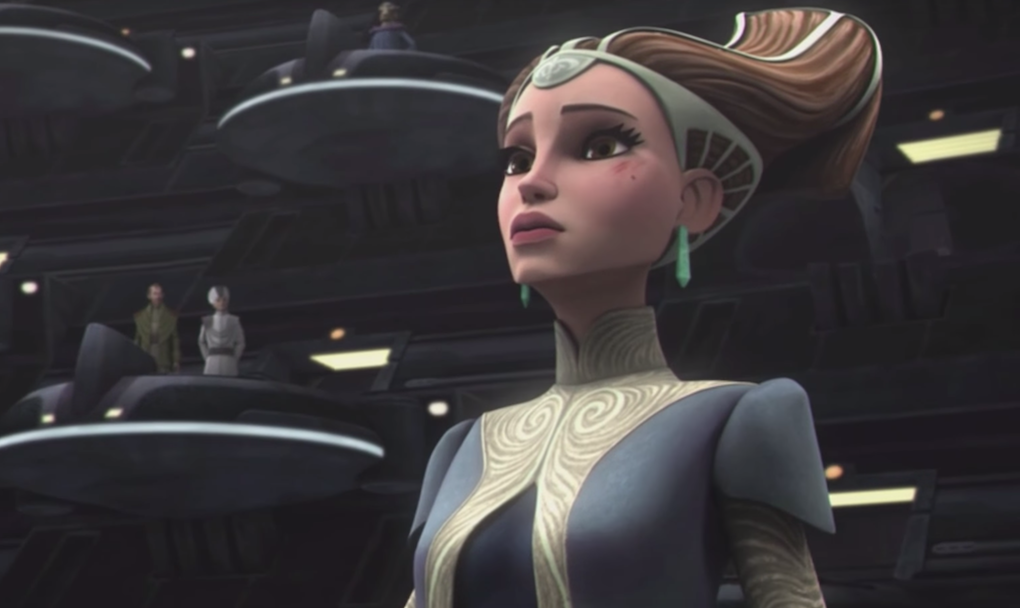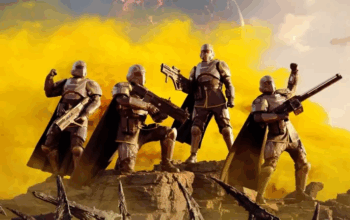One element that distinguishes Star Wars: The Clone Wars [TCW] from other animated shows was its heavy focus on the political theater of war, dividing fans upon its release.
This was especially predominant in the first half of season 3, with most story arcs involving Padme or Bail Organa making negotiations. It’s clear that despite all the backlash from the prequels for having too much politics, Lucas stuck to his guns to make these episodes politically charged. In some way that is commendable for a filmmaker to stick to their guns in spite of criticisms – but the main issue here is in the execution.
Good Ideas, Wrong Demographic

“Hey, kids! Do you wanna learn about the importance of bank loans and interest rates?… No?”
Well, that’s essentially what viewers were treated to through the first half of the series’ third season.
Now, I believe the politics of Star Wars should be discussed – particularly the politics of 40-20 ABY that led up to the conflicts in the first place – but the problem here lies in the medium: The target demographic of the show has always been children who are likely not going to follow what this is all about. I’m an adult and I still barely know what they are talking about.
Political themes can work, but it has to be done with a more appropriate audience in mind.
If instead, TCW was a live-action series or given a *much* more a mature tone like Arcane it would have been more accepted. However, this show was (and always has been) targeted at the 8-13-year-old crowd, and debates on tax policy are simply not going to appeal to them. The average kid isn’t going to wait another week just for another installment of how “raising the Republic’s loans” (yes there’s an episode about that) affects the Clone Wars. It’s the “taxation of trade routes” from The Phantom Menace all over again.
In many ways season 3 was when TCW was at its lowest. When you have to wait another week for another 22 minutes of people just talking and no space battles you’re just going to leave a bad impression. It wasn’t until the season’s 2nd half such as the Nightsisters and Mortis arcs that the show truly started to find its footing.

That said, there are ways that this can be done well for the purpose of world-building and seeing how the Republic operates – see my Darth plagues articles for more details on that.
The topics which they discuss arcs are interesting like war profiteering, govt Corruption, and clandestine peace negotiations among opposing Party members. There are a lot of layers to these episodes and can work in a Star Wars show.
Themes discussed
All criticisms aside, looking back at them now as an adult, It’s commendable that the show went as far as it did. In any way has become far more relevant now than it did 10 years ago when this show aired. The Purpose of those episodes, much like the prequels is to show how democracy can fall into a dictatorship without people realizing it, and it happens in slow steps that aren’t immediately picked up.
Neutrality, Domestic Extremism, and Corruption
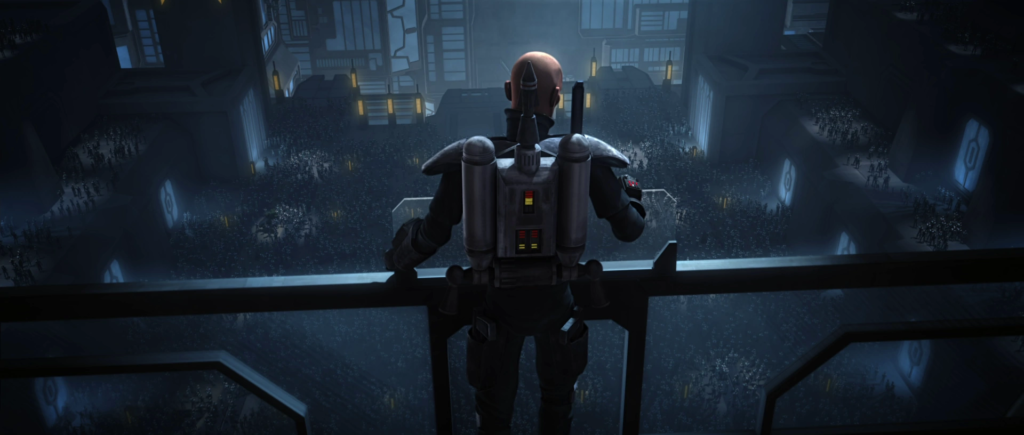
One series of episodes that has divided a lot of fans was the depiction of Mandalore.
The circumstances are worth an article of its own, but borderline the once warrior planet is now led by a reformed pacifist regime led by Duchess Satine Kryze. Mandalore who has a seat in the Republic leads a league of neutral worlds within the republic that refuse to commit to the war effort. Remaining neutral, however, does have its own share of problems as the republic refuses to send aid to neutral systems. As a result, corrupt factions within Staines regime secretly orchestrated by her Prime minister Almec reached out to black-market goods unmitigated shipment has resulted in drink imports being tainted by a toxic diluting agent. Tainted drinks poisoning epidemic among Mandalors youth. Despite the Corruption being uncovered this shows a clear weakness behind her government.
While Satine is framed by the narrative as morally in the right, it is very clear the reality of a pacifist state in a time of war is doomed from the start. The lack of aggressive policies and organized law enforcement is likely a reason for Satine’s downfall. By refusing to compromise when being surrounded by hostile actors, her policies permitted corruption that lead all the way to the top. This allowed the Mando Deathwatch movement to tear apart the regime from the inside after forming an alliance with a new criminal organization led by Maul. Satine’s murder and death allowed the warrior society to seize power once again, only to succumb to more infighting when Maul hijacked its traditions to assume power.
War Profiteering
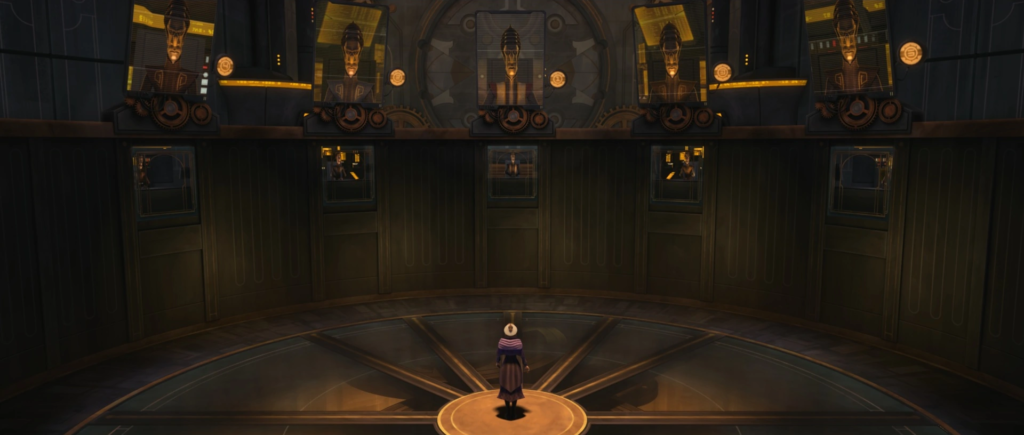
When working on the prequels, George Lucus was heavily influenced by the rise of the right-wing corporatists rising in American politics during the 90s that obstructed progress and deregulated unethical business practices. In fact, according to Lucas, Nute Gunray was heavily influenced by Newt Gingrich. The idea of corporations meddling in the democratic system carried on into the prequels.
One notable part of the Galactic Republic is that corporate organizations like the Trade Federation and Banking Clan literally have representation in the government. This is like the equivalent of American companies like Amazon having representatives in the US Congress. Since these conglomerates like to sell resources to both sides, most predominantly for the separatists, it is in their financial interests to keep the war going.
This is a parallel seen in during major wars where companies have been known to sell to both sides during a large-scale war. During the American Civil War, gun manufacturer Samuel Colt gladly sold his famous revolvers to both the north and the south. Similarly, companies stationed in neutral Sweeden sold weapons and raw materials to the Allies and the Germans during both World Wars.
In one episode – “Heroes on Both Sides” – Padme and Ahsoka secretly travel to the Separatist capital of Raxus to reach out to a pro-separatist senator Mina Bonteri whom together they reach a deal to reach their respective governments to start peace talks. However, peace talks were the last thing that corporate allies in the Senate would want so secretly conspired with Count Dooku to devise a bombing on the Coruscant power grides to halt any sort of talks.

Just imagine Jeff Bezos negotiated with a “Chinese Virology Lab” to spread more COVID so we can keep streaming Amazon Prime. The reality is war is good for business, and often highly influential figures in government have a financial stake involved.
Financial Cost of War

In the following episode “In Pursuit of Peace”, with talks halted the Republic was set to take a massive loan that would fund more military buildup. Banking Clan charging as much as 20 percent interest on the republics Loans.
Padme through an impassioned speech pursued the senate even bringing up her housemaid As a face for the average republic citizen The episode conspicuously ends with Palpatine and Mass Ameda lamenting how Padme was so persuasive. It was effectively the John McCain thumbs down moment. The episode’s ending also reveals some very interesting insight about Palpatine himself as he acknowledges even though he had so much power there is only so much he can do.
Imperfect Order
One element that gets addressed later in the series is the ineptitude of the Jedi order. In a way the Jedi served as something like the clergy in the star wars universe, yet despite their public stances that they are a separate branch of the galactic republic there very much involved in republic affairs. This was made clearer with the advance of the clone wars and the Jedi knights being the only official armed wing of the republic becoming effectively the ones leading and strategizing the newly created grand army of the republic.
In a way, this was Palpatine’s ultimate masterstroke was framing the Jedi as the villain’s peace as the war drags on, public opinion was skillfully manipulated to be less towards Palpatine but towards the Jedi. in order for Palpatine’s plan to succeed he needs to frame himself as the republics savior while the Jedi leading the war effort as the enemies of peace and justice. All this While the Jedi did very little to resolve public confidence. This was the perfect propaganda for Chancellor Palpatine, as it stalls the possibility that the Jedi would be martyred or hidden away when order 66 was executed.
Centralization of Powers

One of TCW’s last politically-themed episodes was late in season 6. This three-parter saw Padme’s ex-lover Clovis a high-ranking affiliate of the banking clan headquartered on the planet Scipio. Scipio is portrayed as the Star Wars equivalent of Switzerland as the financial capital of the galaxy where both the Galactic Republic and Separatist governments hide their funds.

Upon clearing corruption, Republic and Separatist diplomats endorsed Clovie’s appointment to the Banking Clan with hopes that he would be a neutral arbiter between both sides’ financial holdings, However, being blackmailed by Duooku Clovis was forced to raise interest on Republic Loans to whom he becomes accused of a separatist puppet. This has caused the republic to invade Scipio and seize the banks. This essentially gives Palpatine control of the galaxy’s financial apparatus. This arc was an allegory of when governments centralize control of the private sector. Imagine the Federal government absorbing Wells Fargo. Now the government has full control and can use your money for anything such as a planet-destroying space station.
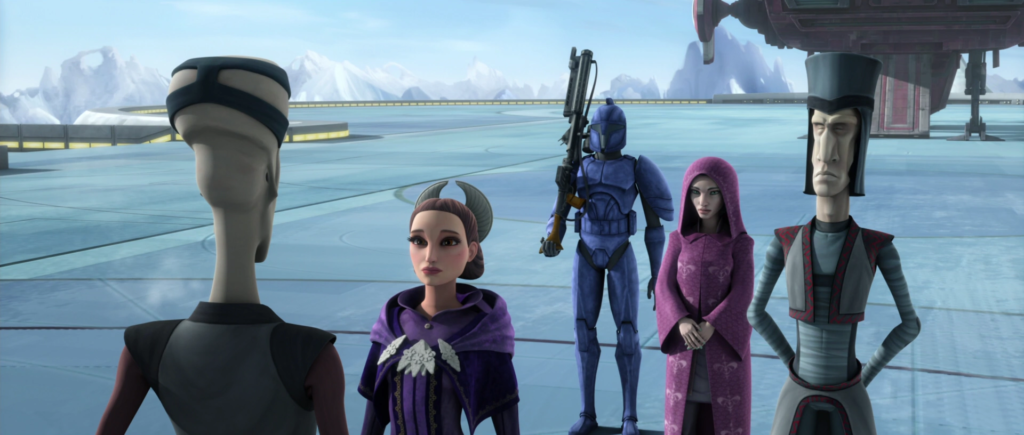
The theme from this arc involves the federal government absorbing the private sector. In deleted scenes in a New Hope and Implied in Empire strikes back, private commerce has been absorbed or heavily regulated by the empire. Seizing the means of production is a major trait followed in many dictatorships whether is to enrich the government, or Get rid of the competition and have power.
Epilogue: Chairman Mouse says “NO”

Regardless of who these episodes were meant for, I do give credit to these going that extra mile to bring into discussion subjects that I doubt would be released by the current Star Wars lineup. It was likely this complex storytelling that Disney sought to bury with its sequel trilogy. However, removing the context over the past 30 years left the sequel trilogy feeling hollow with no clear understanding of how the post Return of the Jedi galaxy worked. The Force Awakens just blows up a random planet that’s supposed to be the Republic’s HQ and that’s it. Yet another element worth another article.
To say Star Wars was never “political” is like saying Star Trek was never “woke”.

For people who complain that star wars shouldn’t be political really haven’t followed Star Wars – its central premise has always been to follow the rise and fall of a fascist Empire. To say Star Wars was never “political” is like saying Star Trek was never “woke”. What matters is how its politics contribute to its story and/or worldbuilding. Whether we understand it or not the politics explored in Clone Wars as well as the prequels are meant to explore how an evil dictatorship can rise in a democratic system. Something that can and should be discussed freely in our media these days.
It allows the audience to think and be aware of how an evil regime can rise from anywhere. This thought-provoking stuff is completely missing in current Star Wars nowadays, as Disney apparently doesn’t want its audience to think at all and that has created much of the new trilogy stale. It is my hope now the sequel trilogy is sidelined for new projects there is a new opportunity for Star Wars to become more nuanced.
